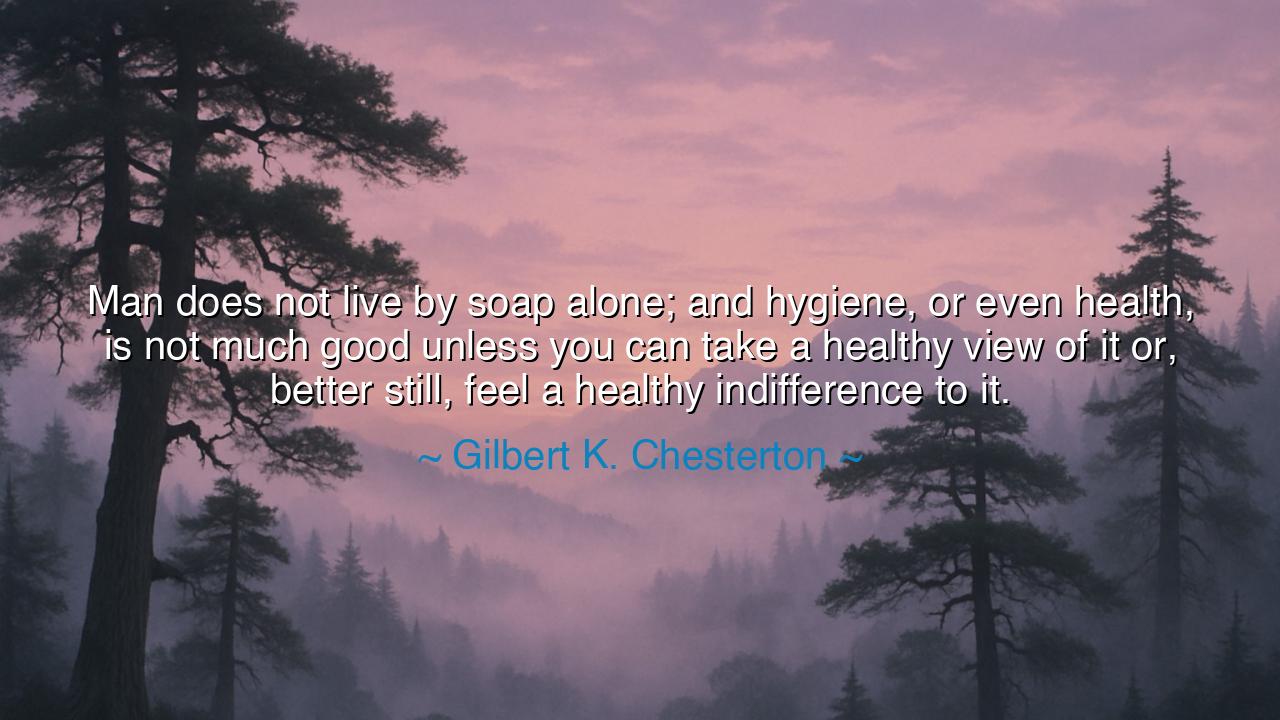
Man does not live by soap alone; and hygiene, or even health, is
Man does not live by soap alone; and hygiene, or even health, is not much good unless you can take a healthy view of it or, better still, feel a healthy indifference to it.






“Man does not live by soap alone; and hygiene, or even health, is not much good unless you can take a healthy view of it or, better still, feel a healthy indifference to it.” — thus wrote Gilbert Keith Chesterton, that mighty defender of paradox and truth. With his wit and his thunderous laughter, he reminded the modern world that cleanliness and health, though valuable, are not the measure of the soul. In this seemingly humorous line, he delivers a timeless rebuke to an age obsessed with surfaces — with the outward signs of purity rather than the inward condition of the spirit. For Chesterton saw that while soap may cleanse the skin, it cannot cleanse the heart, and that a man may live in spotless rooms yet carry despair within him.
Chesterton lived in the early years of the twentieth century, an age when science and reason had risen like new gods over the ruins of faith. The world was learning to worship hygiene, health, and progress, as though man could be perfected by sanitation and systems alone. He saw this worship of health as a form of spiritual poverty — the attempt to replace the old moral virtues with bodily ones, to measure life not by truth or love but by the thermometer and the diet. His jest, “Man does not live by soap alone,” is both a parody and a prophecy. It echoes the ancient words of Scripture — “Man does not live by bread alone” — and transforms them into a warning for his own generation: that life must be more than the maintenance of the body; it must also feed the soul.
When Chesterton speaks of a “healthy indifference” to health, he means not neglect, but balance. To care for the body is right; to worship it is slavery. True health, he suggests, is not in fearing disease, nor in boasting of vigor, but in forgetting oneself altogether — in living joyfully, bravely, and unselfconsciously. A man who thinks too much about his health becomes sick in spirit, for the self that is forever measured cannot be free. Better to laugh, to love, to live in wonder, than to count every breath as if it were a treasure guarded from time. The wise man bathes his body, but purifies his heart with gratitude and laughter.
Consider the life of Florence Nightingale, the Lady with the Lamp, who brought cleanliness and compassion into the dying fields of war. She valued hygiene not as an idol but as a means of mercy. Her mission was not merely to cleanse wounds but to restore dignity, to heal both the body and the soul. In her, Chesterton’s truth shines clear: that health without humanity is hollow, and that cleanliness without compassion is a lifeless ritual. It is not soap that sanctifies the world, but the spirit of love that moves through the hands that wash it.
Chesterton’s wisdom cuts even deeper for our modern age, which bows before the cult of wellness and perfection. We are surrounded by voices that tell us what to eat, how to breathe, what to avoid — and yet, in our pursuit of perfect health, we grow anxious, weary, and afraid. We have forgotten what it means to feel alive. The body, though sacred, is not the whole of man. It is the temple — but the soul is its fire. Without that fire, all the cleanliness in the world cannot make a life worth living. Thus, Chesterton teaches that true hygiene is not just of the flesh, but of the spirit — to keep the heart free from fear and the mind from pride.
This philosophy is not carelessness but freedom. The man who can take a “healthy view” of health is one who knows that life is more than its physical condition. He walks through the world with cheer, neither afraid of illness nor enslaved to health, knowing that his joy is his true immunity. He tends his body as a gardener tends his soil — diligently, but without worship. And when pain or sickness comes, as it must to all, he faces it not as tragedy but as part of the great adventure of being alive.
Lesson: Care for your body, but do not make it your master. Wash your hands, but also wash your heart of envy and fear. Seek health, but do not lose your soul in its pursuit. Remember that the purpose of strength is not to preserve life endlessly, but to live it nobly. Laugh often. Love deeply. Let your spirit remain greater than your skin. For no soap, however pure, can cleanse the heart of worry — only a cheerful courage can do that.
Thus, Chesterton’s words ring through the ages like a bell of good humor and good sense: “Man does not live by soap alone.” Cleanse yourself, yes — but never forget that joy, faith, and love are the true disinfectants of life.






AAdministratorAdministrator
Welcome, honored guests. Please leave a comment, we will respond soon